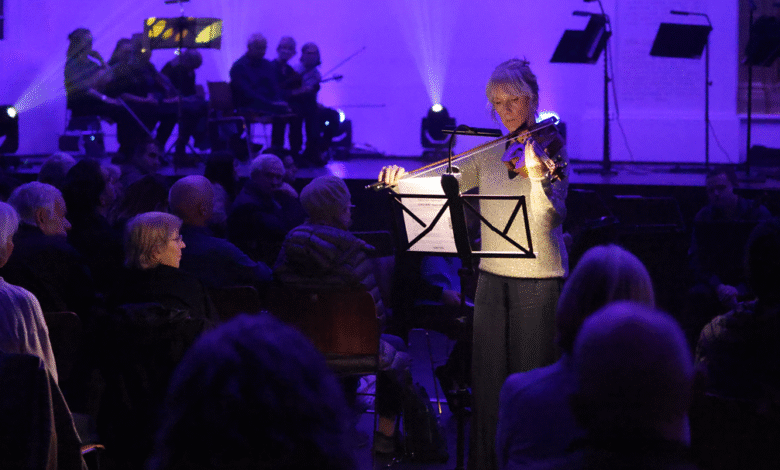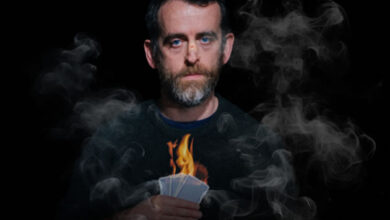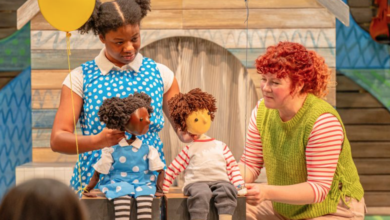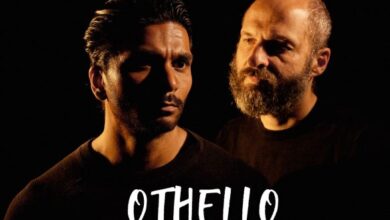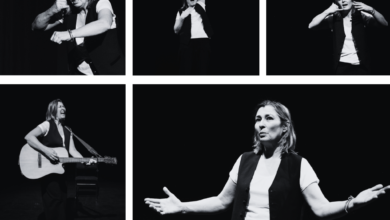An immersive, theatrical journey through four centuries of music. Clever staging, individual instrument highlights, insightful commentary, and dynamic lighting creates a unique storytelling experience that carries the audience from night to dawn.Rating
Excellent
The City of London Sinfonia (CLS) continues its 2025 New Frontiers season in the stunning Hackney Church last night: a vast white space with a domed ceiling and galleried areas to the sides and back. An iconic building for an iconic performance.
The CLS prides itself on using orchestral music to tell stories and reach wider audiences, combining cross-art collaborations with occasional supplementary insights from the Lead. From Dusk to Dawn is particularly sublime: pieces spanning four centuries, composed by a variety of artists, all drawing inspiration from the hours of darkness. The trajectory concludes as the final works gradually crescendo through the waking hours of dawn.
The music is magnificent, but the performance is much more than that: it carries a sense of humour throughout, alongside a masterful use of positioning and lighting. The orchestra begins on stage in darkness, seemingly ready, only for the sonorous tones of a cello to swell from behind the audience, gently intensifying. Will Scholfield commands attention with his performance of Bach’s Prelude from Cello Suite No. 5 in C minor, at the back on the balcony, metres above the audience: unseen, but definitely not unheard. Initial confusion turns swiftly to smiles as the audience turns together to locate the source of the sound.
A further ten compositions follow, each distinct: some humorous, some less so. The programme includes composers who are not obvious bedfellows, and to further immerse the audience in the journey, Creative Director Alexandra Wood provides nuggets of information as we go along. We learn, for example, that in the 18th century, composers mostly worked directly for benefactors, composing to order, and that audiences would recognise music and appreciate the humour in deliberately combining two separate compositions. We also learn that composer William Herschel (Movement I from Symphony No. 2 in D) was a successful astronomer, discovering the planet Uranus in 1781, the first to be identified since antiquity, and that he built his own telescope. As you do.
The stage is frequently reconfigured to accommodate the main instruments, but occasionally something unusual happens, such as a quintet of strings and oboe for Eleanor Alberga’s Succubus Moon sitting in the aisle among the audience, almost invisible. A subtle immersion, if you like.
Each instrument is given a moment to shine individually, with unique, idiosyncratic mannerisms evident to the audience. The horn, for example, emits a low-frequency oscillation in Interstellar Call, traversing the cosmos. Fiona Bonds seems barely to move her bow in the solo viola piece Weroon Weroon, yet the staccato sound is striking: a meditation on the African and European strands of colonial history. The bassoon is deeply humorous, shaking with energy centre stage in Vivaldi’s La Notte, and Alexandra Wood’s violin is nothing short of majestic. Always.
I cannot finish without reference to the lighting. A handful of simple mobile units sit on stage, transforming the ceiling throughout the performance: articulating the time of day or night and reflecting the mood of each work. It may not be perfect (there are a couple of moments that feel slightly awkward) but for the most part, the lighting is striking or subtle, illuminating or dark as required, slowly rising for dawn by the end of the final piece.
The CLS delivers far more than an orchestral performance: it tells each story with powerful expression, giving each instrument its own unique voice.
Creative Director and Violin: Alexandra Wood
Lighting Design by Eliott Griggs
Viola: Fiona Bonds
Oboe: Owen Dennis
Basson: Ursula Leveaux
Cello: Will Schofield
Horn: Stephen Stirling
From Dusk Til Dawn has completed its run. To find out more about future performances by
The City of London Sinfonia visit their website below.


